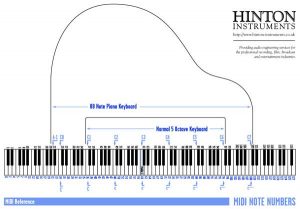

notes: list of Note (one Note for each note in the track).TrackData: contains all the data for a single track

data.getTrack(1) to get the data for the second track) getTrack(index): returns the TrackData with the given index (ex.tracks: list of TrackData (one TrackData for each track in the file).where CCCC is the MIDI channel (0 to 15) and XXXXXXX is the instrument number from 0 to 127. It has one STATUS byte and one DATA byte : Status byte : 1100 CCCC. getNumTracks(): number of tracks in the midi file The MIDI message used to specify the instrument is called a 'program change' message.MidiData: contains all data for a midi file (created by calling MidiData("midi_file.mid") where "midi_file.mid" is the path to the midi file)
#Midi note number chart pro
Midi Note / Midi Number chart - Beatstep Pro When you buy products through links across our site, we may earn an affiliate commission. Structure (only intended output values listed): I have just been through an hour of my life working out the Roland weird number system to Beatstep pro friend note values to map the TR8s instruments to pads on my Beatstep Pro so I have more pads. TrackData, MidiData, and Note may need to imported. TrackData.events contains the midi events in the track, and each event has a startTime field in milliseconds. trackData.name contains the name of the track, which may be the name of the instrument on that track. Each Note also has a pitchįield in the range 0 - 127. If a MIDI file is programmed to the General MIDI protocol, then the results are predictable, but timbre and sound fidelity may vary depending on the quality of the GM synthesizer. ananya is the note on message, ananya.data1 is the note number and ananya.data2 the velocity. Milliseconds (as well as a length() function that returns the length in milliseconds). begingroup Also, from my understanding of the code, ge is the pitch bend message ge.data2 its MSB and ge.data1 its LSB. Each Note has a startTime and endTime field, defined in TrackData.notes is a list containing the notes for that track, sorted by start time. There are links to a list of technical books, charts, graphs. If trackData = midiData.getTrack(index) then Musical Note-To-MIDI Note Number Conversion, Convert any musical note to the MIDI Standard. The number of tracks created can be checked by calling midiData.getNumTracks().Ī TrackData can be retrieved by calling midiData.getTrack(index). To do this, create a MidiData (ex midiData = MidiData("testMidiFile.mid")).Īll the data should be initialized by the constructor. (This isn't meant to create or manipulate midi files it is just to get data from them.)Īt this point, this script should be able to take a format one midi file that has one channel per track,Īnd create Notes with start and stop times. For type zero midi files, a single track is creating containing all notes. This works with with type one midi and type zero midi files. The idea here is to decode midi files into objects that are easy to extract data from, primary by making tracks into objects that contains notes, which are objects themselves.


 0 kommentar(er)
0 kommentar(er)
